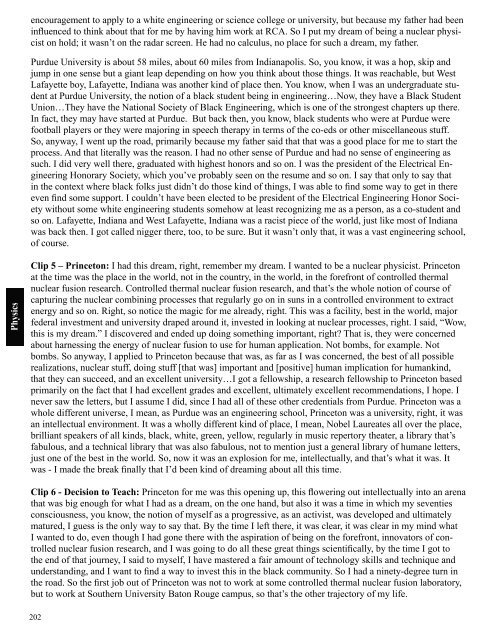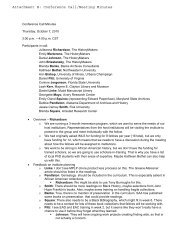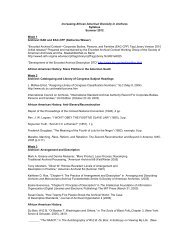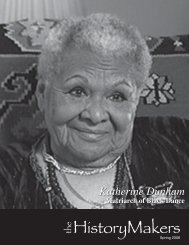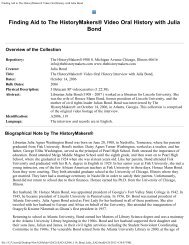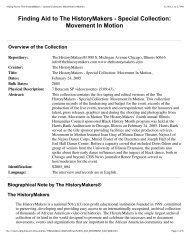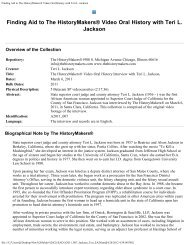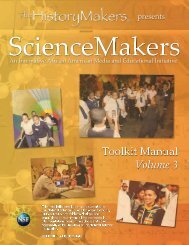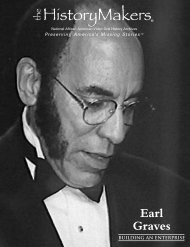ScienceMakers Toolkit Manual - The History Makers
ScienceMakers Toolkit Manual - The History Makers
ScienceMakers Toolkit Manual - The History Makers
You also want an ePaper? Increase the reach of your titles
YUMPU automatically turns print PDFs into web optimized ePapers that Google loves.
Physics<br />
encouragement to apply to a white engineering or science college or university, but because my father had been<br />
infl uenced to think about that for me by having him work at RCA. So I put my dream of being a nuclear physicist<br />
on hold; it wasn’t on the radar screen. He had no calculus, no place for such a dream, my father.<br />
Purdue University is about 58 miles, about 60 miles from Indianapolis. So, you know, it was a hop, skip and<br />
jump in one sense but a giant leap depending on how you think about those things. It was reachable, but West<br />
Lafayette boy, Lafayette, Indiana was another kind of place then. You know, when I was an undergraduate student<br />
at Purdue University, the notion of a black student being in engineering…Now, they have a Black Student<br />
Union…<strong>The</strong>y have the National Society of Black Engineering, which is one of the strongest chapters up there.<br />
In fact, they may have started at Purdue. But back then, you know, black students who were at Purdue were<br />
football players or they were majoring in speech therapy in terms of the co-eds or other miscellaneous stuff.<br />
So, anyway, I went up the road, primarily because my father said that that was a good place for me to start the<br />
process. And that literally was the reason. I had no other sense of Purdue and had no sense of engineering as<br />
such. I did very well there, graduated with highest honors and so on. I was the president of the Electrical Engineering<br />
Honorary Society, which you’ve probably seen on the resume and so on. I say that only to say that<br />
in the context where black folks just didn’t do those kind of things, I was able to fi nd some way to get in there<br />
even fi nd some support. I couldn’t have been elected to be president of the Electrical Engineering Honor Society<br />
without some white engineering students somehow at least recognizing me as a person, as a co-student and<br />
so on. Lafayette, Indiana and West Lafayette, Indiana was a racist piece of the world, just like most of Indiana<br />
was back then. I got called nigger there, too, to be sure. But it wasn’t only that, it was a vast engineering school,<br />
of course.<br />
Clip 5 – Princeton: I had this dream, right, remember my dream. I wanted to be a nuclear physicist. Princeton<br />
at the time was the place in the world, not in the country, in the world, in the forefront of controlled thermal<br />
nuclear fusion research. Controlled thermal nuclear fusion research, and that’s the whole notion of course of<br />
capturing the nuclear combining processes that regularly go on in suns in a controlled environment to extract<br />
energy and so on. Right, so notice the magic for me already, right. This was a facility, best in the world, major<br />
federal investment and university draped around it, invested in looking at nuclear processes, right. I said, “Wow,<br />
this is my dream.” I discovered and ended up doing something important, right? That is, they were concerned<br />
about harnessing the energy of nuclear fusion to use for human application. Not bombs, for example. Not<br />
bombs. So anyway, I applied to Princeton because that was, as far as I was concerned, the best of all possible<br />
realizations, nuclear stuff, doing stuff [that was] important and [positive] human implication for humankind,<br />
that they can succeed, and an excellent university…I got a fellowship, a research fellowship to Princeton based<br />
primarily on the fact that I had excellent grades and excellent, ultimately excellent recommendations, I hope. I<br />
never saw the letters, but I assume I did, since I had all of these other credentials from Purdue. Princeton was a<br />
whole different universe, I mean, as Purdue was an engineering school, Princeton was a university, right, it was<br />
an intellectual environment. It was a wholly different kind of place, I mean, Nobel Laureates all over the place,<br />
brilliant speakers of all kinds, black, white, green, yellow, regularly in music repertory theater, a library that’s<br />
fabulous, and a technical library that was also fabulous, not to mention just a general library of humane letters,<br />
just one of the best in the world. So, now it was an explosion for me, intellectually, and that’s what it was. It<br />
was - I made the break fi nally that I’d been kind of dreaming about all this time.<br />
Clip 6 - Decision to Teach: Princeton for me was this opening up, this fl owering out intellectually into an arena<br />
that was big enough for what I had as a dream, on the one hand, but also it was a time in which my seventies<br />
consciousness, you know, the notion of myself as a progressive, as an activist, was developed and ultimately<br />
matured, I guess is the only way to say that. By the time I left there, it was clear, it was clear in my mind what<br />
I wanted to do, even though I had gone there with the aspiration of being on the forefront, innovators of controlled<br />
nuclear fusion research, and I was going to do all these great things scientifi cally, by the time I got to<br />
the end of that journey, I said to myself, I have mastered a fair amount of technology skills and technique and<br />
understanding, and I want to fi nd a way to invest this in the black community. So I had a ninety-degree turn in<br />
the road. So the fi rst job out of Princeton was not to work at some controlled thermal nuclear fusion laboratory,<br />
but to work at Southern University Baton Rouge campus, so that’s the other trajectory of my life.<br />
202


